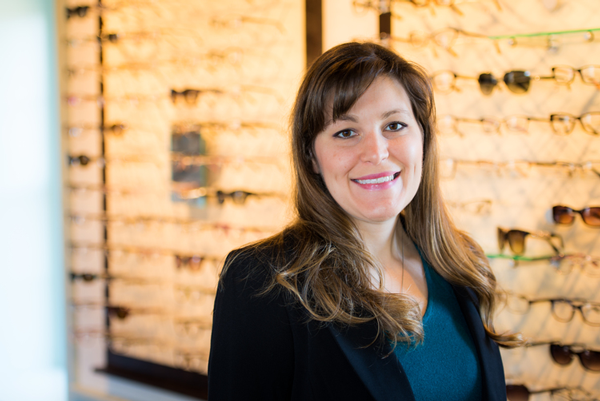

From the get-go, Melissa Richard, OD, knew she wanted to specialize. After earning her Masters in Low Vision Rehabilitation at the Pennsylvania College of Optometry at Salus University, she set out to make a difference and start a business, Spectrum Vision Care in Chalfont, Pennsylvania. She recalls a patient who loved to go out to eat with his wife, but his low vision meant he couldn’t read the menu himself. After she fit him with a new pair of near-distance eyeglasses, he happily reported his progress. “It’s rewarding,” Dr. Richard says, “you really could make a difference in someone’s life.”
A VERY GOOD PLACE TO START
As far as profitable business goes, Dr. Richard has found her specialty to be a good fit. “I can bill these patients’ medical insurance for these services. To have that other source of income rather than relying on managed vision plans has been really good,” she says. Along with helping her gain a foothold in medical billing, low vision products have opened a new door for sales, as well. “We sell optical aid devices from a check writing guide to bump dots to telescopes, CCTVs and portable video magnifiers.” Of course, this inventory and process comes with some extra effort. These patients require a longer exam slot that often includes a follow-up visit, so it’s important to keep that time clear so she doesn’t fall behind in the schedule or frustrate waiting patients.
CONNECTING WITH COLLEAGUES
“Being a low vision specialist is a great way to get referrals from other local ophthalmologists as well as optometrists. I send patients back to their OD or optician if they need a change in their eyeglasses prescription (as long as it’s not too complicated or something that needs to be done at a specialty lab), and I send a letter to the doctor who referred summarizing what we did and when they would follow up with me if needed,” she says. It’s been a good practice-builder and a good way to connect with colleagues in the region.
2020 VISION
Dr. Richard is confident that other practices can do well by adding low vision services. “I do think everyone will be seeing more of these patients, because people are living longer and experiencing age-related vision loss, such as age-related macular degeneration (AMD). People with AMD have vision they can work with,” Dr. Richard says. “I can show them things that can help.” Dr. Richard notes that she has received great counsel from Eschenbach to learn best practices for treating patients with low vision. She also recommends having some optical aids on hand. “Get a set of magnifiers; if it works for the patients, they could purchase them in your office.” Gain some hands-on experience with the available tools and resources, she says. “It takes a little training because you have to be comfortable with it. There is training available.”
Work With Reputable Companies
Lots of devices for low vision are promoted on the internet and through social media. It’s difficult to know if these products have any value, and Dr. Melissa Richard wants to make sure that patients purchase products that work. So she works with a representative from Enhanced Vision, a company that exclusively offers video magnification devices. “The rep will meet the patient here at my office to demonstrate some of the larger equipment (CCTVs) or he will meet them at the patient’s home. Patients really appreciate this,” she says.
In addition, she earns the profit from the sale, which is smaller on these large devices than it is on small ones, but there’s no extra work and “it’s still a help to me. It can be a life-changer for my patients who never thought they could read again,” she says.



